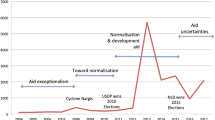
Overview
- Provides a critique of parliamentary support in fragile and transition states and stable democracies
- Includes case studies from Ghana, Serbia, Afghanistan, Bangladesh, Kyrgyzstan along global and regional project examples
- Comparative perspective on fragile states, transitional states, and stable democracies
- Develops a synthesis of lessons learned on how international development and parliamentary actors can improve their assistance to parliaments and legislative bodies
Access this book
Tax calculation will be finalised at checkout
Other ways to access
About this book
This book is based on experience and reflections related to international support provided to parliaments and legislative bodies both in selected countries (Afghanistan, Bangladesh, Ghana, Serbia, and Kyrgyzstan) and globally. The author intends to provide a critique of parliamentary support, as part of development assistance or foreign aid, for having been conceived in narrow terms of technical assistance and for failing to appreciate that aid effectiveness calls for a sound understanding of a country’s politics, culture, and history. The monograph examines the effectiveness of aid in both stable democracies, and fragile and transition countries. The project is ideal for audiences interested in regional politics, the Middle East, Africa, South Asia, Central Asia, and development/democracy studies.
Similar content being viewed by others
Keywords
Table of contents (9 chapters)
-
Front Matter
-
Back Matter
Reviews
“Dr. Monjurul Kabir has drawn on his extensive knowledge and experience as a development scholar and practitioner to navigate the vexed area of `Parliamentary Development Support’, through development assistance, in a targeted number of countries. He succeeds in his intention to challenge the ‘neutrality’ of Parliamentary Support and the need to ensure that it is responsive to the specific context. This read is useful for development practitioners, scholars of regional politics and politicians.” (Geraldine J. Fraser-Moleketi, Chancellor, Nelson Mandela University, Chair of the Committee of Experts on Public Administration, UN ECOSOC, and Former Minister of Public Service and Administration, South Africa)
“There has been a long and ongoing debate on the effectiveness aid as an instrument for promoting democracy. The opinion is divided. This book will fill a critical gap in knowledge and empirical evidence on effectiveness of democracy assistance. Focusing on how parliaments in both stable democracies, transition and fragile states can be revitalized, the book essentially assessed the political economy of development aid. Dr. Monjurul Kabir breaks a new ground here following a blended approach of theory,evidence base, and actual development project examples. The book will interest a large audience globally at both policy level and academic circles.” (Gowher Rizvi, International Affairs Adviser to the Prime Minister, Bangladesh)
“Beyond elections, democracies are strengthened by inclusive and effective parliaments which represent all the people and hold the powerful to account. Alas in many developing states worldwide, these institutions remain rubber stamps unable to check the executive, riven by conflict, undermined by corruption, failing to reflect the interests of all sectors of society, lacking the professional capacity to scrutinize budgets and write laws. This account provides important insights into the efforts of the international community to build legislatures – and why technical assistance by itself is insufficient without the political will to share power. The book- Development Aid in Stable Democracies and Fragile States – by Monjurul Kabirwould be an essential volume for understanding recovery in fragile states, international development, and pathways to democracy.” (Pippa Norris, Professor, John F. Kennedy School of Government, Harvard University, USA)
“A valuable addition to the literature on both parliaments and international development assistance…based on first-hand experience of the author, both as a technical expert and a senior manager of development assistance programmes, I cannot think of an author better placed to elicit lessons from experience than Monjurul Kabir.” (Ramaswamy Sudarshan, Professor and Dean, Jindal School of Government and Public Policy, India)
“Under international law, people have a right to take part in the conduct of public affairs. In an era when confidence in democracies appears to be unraveling, Monjurul Kabir explores a promising avenue for the right to participation to be realized in practice by demonstrating the value that development aid to Parliaments can have in boosting people's participation both in stable democracies and fragile states.” (Marcia V.J. Kran, Expert member of the UN Human Rights Committee (2017-2020), Canada)
Authors and Affiliations
About the author
Monjurul Kabir is Senior Adviser and Chief of Section, Asia-Pacific, LDCs, and SIDS with UN Women at United Nations, New York, USA. He is a political scientist, governance, human rights, and gender expert.
Bibliographic Information
Book Title: Development Aid in Stable Democracies and Fragile States
Authors: A. H. Monjurul Kabir
DOI: https://doi.org/10.1007/978-3-319-92174-7
Publisher: Palgrave Macmillan Cham
eBook Packages: Political Science and International Studies, Political Science and International Studies (R0)
Copyright Information: The Editor(s) (if applicable) and The Author(s) 2019
Hardcover ISBN: 978-3-319-92173-0Published: 02 August 2018
Softcover ISBN: 978-3-030-06377-1Published: 14 December 2018
eBook ISBN: 978-3-319-92174-7Published: 21 July 2018
Edition Number: 1
Number of Pages: XXIII, 236
Number of Illustrations: 3 b/w illustrations
Topics: Development Theory, Development Policy, Regional Development, Development and Social Change, Development Aid



